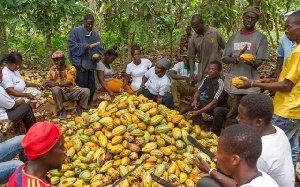Ghana 's cocoa production is expected to hit two million (2m) metric tonnes by 2019, that's according to the Chief Executive Officer (CEO) of COCOBOD, Joseph Boahen Aidoo.
He said the current total national capacity of 968,000 metric tons of cocoa was woefully inadequate to generate the needed revenue to support national development and therefore expressed its resolve to work tirelessly and put pragmatic measures and other innovative programs and policies in place to realise that feat.
The COCOBOD CEO said this when he addressed farmers in Breman Asikuma in the Asikuma-Odoben-Brakwa (AOB) District as part of his tour of the Region to engage stakeholders in the cocoa industry and to get first hand information on challenges inhibiting their work.
Other areas he toured included Twifo-Praso in the Twifo-Atti-Morkwaa District, Adiembra, Assaman, and Onwa in Assin South District and later addressed a durbar of workers and farmers at Assin Fosu in the Assin North Municipality.
Mr. Aidoo Boahen indicated that the cocoa value chain industry was worth over 140 billion dollars but Ghana received only one percent of the figure and expressed government’s determination to make cocoa farming more rewarding and attractive.
As part of the new policy interventions, he assured that his outfit had employed the services of over 30,000 cocoa farmers from across the country who had been introduced to the hand pollination technique to enable them to boost crop yield and returns.
Through the artificial pollination, the crop yield per hectare could hit two tonnes from the current average of 400 kilograms the farmers are getting because they have the flexibility to pollinate about 10 to 12 trees daily.
Pollination, combined with fertilizer application would significantly restore the country's cocoa production capacity, adding that a hand pollinated cocoa tree could yield between 100 and 500 pods.
Mr. Aidoo also stated that COCOBOD was keen on introducing new technologically inclined methods and processes into cocoa farming with modernized machines.
In line with it, he gave the assurance that beginning 2018, his outfit would commence a new programme dubbed "national mass cocoa pruning" to prune cocoa trees with sophisticated pruning, weeding and harvesting.
The policy will among other things ensure that farmers are effectively educated on the best agronomic cultural practices to improve yield and prevent the spread and outbreak of diseases.
Mr. Aidoo said measures are being put in place to introduce irrigation systems to most demonstration farms to ensure all year planting.
He encouraged the youth to take advantage and become part of the cocoa industry, adding that the African Development Bank in collaboration with the Government of Ghana has earmarked some funds to support the youth in cocoa farming and agriculture in general.
Mr. Aidoo advised cocoa farmers to make good use of the fertilizers given them at a subsidized price and not to smuggle them to neighbouring countries to the detriment of Ghana
Executive Director of the Cocoa Health and Extension Division (CHED), Emmanuel Opoku, announced that Government had procured new machines and equipment to support the 20,000 people engaged in the on-going mass cocoa spraying to help revive the cocoa industry.
The CEO spoke of the devastation of cocoa farms by the black pod disease ( Swollen shoot), among other newly discovered diseases and said efforts at tackling the diseases would be scaled up to bring them to the barest minimum.
Business News of Friday, 10 November 2017
Source: gbcghana.com












